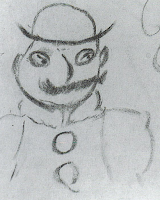It little profits that an idle king,
By this still hearth, among these barren crags,
Match'd with an aged wife, I mete and dole
Unequal laws unto a savage race,
That hoard and sleep, and feed, and know not me.
I cannot rest from travel: I will drink
Life to the lees: all times I have enjoy'd
Greatly, have suffer'd greatly, both with those
That loved me, and alone; on shore, and when
Thro' scudding drifts the rainy Hyades
Vext the dim sea: I am become a name;
For always roaming with a hungry heart
Much have I seen and known; cities of men
And manners, climates, councils, governments,
Myself not least, but honour'd of them all;
And drunk delight of battle with my peers,
Far on the ringing plains of windy Troy.
I am a part of all that I have met;
Yet all experience is an arch wherethro'
Gleams that untravell'd world, whose margin fades
For ever and for ever when I move.
How dull it is to pause, to make an end,
To rust unburnish'd, not to shine in use!
As tho' to breathe were life. Life piled on life
Were all too little, and of one to me
Little remains: but every hour is saved
From that eternal silence, something more,
A bringer of new things; and vile it were
For some three suns to store and hoard myself,
And this gray spirit yearning in desire
To follow knowledge, like a sinking star,
Beyond the utmost bound of human thought.
This is my son, mine own Telemachus,
To whom I leave the sceptre and the isle —
Well-loved of me, discerning to fulfil
This labour, by slow prudence to make mild
A rugged people, and thro' soft degrees
Subdue them to the useful and the good.
Most blameless is he, centred in the sphere
Of common duties, decent not to fail
In offices of tenderness, and pay
Meet adoration to my household gods,
When I am gone. He works his work, I mine.
There lies the port: the vessel puffs her sail:
There gloom the dark broad seas. My mariners,
Souls that have toil'd, and wrought, and thought with me —
That ever with a frolic welcome took
The thunder and the sunshine, and opposed
Free hearts, free foreheads — you and I are old;
Old age hath yet his honour and his toil;
Death closes all: but something ere the end,
Some work of noble note, may yet be done,
Not unbecoming men that strove with Gods.
The lights begin to twinkle from the rocks:
The long day wanes: the slow moon climbs: the deep
Moans round with many voices. Come, my friends,
'Tis not too late to seek a newer world.
Push off, and sitting well in order smite
The sounding furrows; for my purpose holds
To sail beyond the sunset, and the baths
Of all the western stars until I die.
It may be that the gulfs will wash us down:
It may be we shall touch the Happy Isles,
And see the great Achilles, whom we knew.
Tho' much is taken, much abides; and tho'
We are not now that strength which in old days
Moved earth and heaven; that which we are, we are;
One equal temper of heroic hearts,
Made weak by time and fate, but strong in will
To strive, to seek, to find, and not to yield.
The 19th century nurtured a Romanticism that excelled in heroes, often backward-looking, like Tennyson's Ulysses, steeped in a mythical heroism that was at once Biblical and Greco-Roman, or occasionally, like Wagner's heroes, steeped in the pagan myths of western Europe. But heroes. O yes, we must have heroes. Byron at Messalonghi, Clive of India, statues to innumerable unknown soldiers who raised the Kiplingesque flag over sunsets never to be completed, and trained for the purpose on the playing fields of Eton. An era in which men endow heroes is an era of supreme self-confidence, and from the aura of the heroes is emitted an energy that can drive others beyond their own boundaries, into the infinitudes of further exploration, greater achievement, deeper insight, higher understanding.
The 20th century, by contrast, excelled in anti-heroes, taking their cues from Machiavelli or Caligula, rather than (however falsely) Alexander the Great or Richard the Lion-Hearted. It was, perhaps, the consequence of World War I, in which more than two million idealisms died from gas or gunshot or dysentery in the trenches; or of World War II, which reduced any remaining idealisms into Zyklon-B, or bombed them into residual atoms, and clouds of liquid hydrogen, and fed the cynical mediocrity of universal proletarian revolution.
 |
| Poldy Bloom, drawn by Joyce |
And as to the 21st century? Elsewhere I have offered my personal philosophy of the Zero Positive and the Immaculate Failure, and shall not restate it here. Yet it seems to me that Tennyson has captured the Immaculate Failure perfectly in this poem. I invite you to read it, not through 19th century eyes, as he intended it, but through 21st century eyes, as we still need it.
You can find David Prashker at:
Copyright © 2016
David Prashker
All rights reserved
The Argaman Press

No comments:
Post a Comment